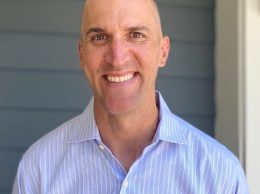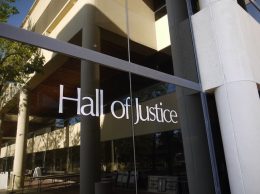
Henry Dubroff
A rock climbing expert with an innate curiosity about markets, Matthew Fienup found his calling in his mid-30s when he won admission to a doctoral program at UC Santa Barbara’s Bren School of Environmental Management.
Now 41 and a professor in California Lutheran University’s Center for Economic Research & Forecasting, he’ll get a view from the commanding heights of the regional economy in November when he takes over as CERF director from retiring Bill Watkins.
Under founding director Watkins, CERF achieved national recognition for the unflinching accuracy of its slow-growth forecasts and whose hallmark has been doubts about the ability of the economy to return to historic growth rates. What Fienup brings to the table is a knack for discovering practical, market-based solutions to big public policy problems.
I sat down with him at the Cajun Kitchen in Ventura on Sept. 27 to get his perspective on the regional economy, water markets and the future of SOAR.
The first thing he stresses is how much continuity there is in the management shift at CERF. Watkins and he shared some of the same mentors and advisors at UC Santa Barbara, where Watkins got his doctorate in economics, also in mid-career. It was a UCSB faculty member who suggested to Watkins that Fienup might be the right person to succeed him.
“It’s a succession plan that’s been two and a half years in the making,” said Fienup, who joined CERF as an adjunct professor and gradually took on a bigger role. Dan Hamilton, who has crunched the numbers for the CLU forecast since it was founded in 2009, will continue to play that key role. “Dan is the best in the business,” said Fienup.
What’s raised Fienup’s profile in the tri-county region is an effort just getting under way to gather market participants and create a market for water pricing and trading in a crucial Ventura County groundwater basin.
As a rock climbing instructor, Fienup said, he learned the skill of building trust quickly with his clients, something that’s prepared him to work with the diverse array of property owners and interests in the water business. Getting the foundation laid for a market-based solution to part of Ventura County’s groundwater problem has been a notable achievement. I’ve seen Fienup win the respect of agricultural interests, county supervisors and economic development experts.
His enthusiasm for market-based solutions doesn’t stop with groundwater. He’s been studying the huge price disparity between property within city curb lines and adjacent properties restricted by Ventura County’s SOAR initiative and has proposed a different kind of solution. He wants to preserve agricultural land indefinitely through a market-based transfer of development rights, working with the Nature Conservancy and other groups.
Such a solution would provide much more flexibility than SOAR in allowing communities to solve their longer-term housing needs, he argued at a recent VCEDA Business Outlook Conference, where he compared Ventura County’s rigid rules to more flexible solutions in Montgomery County, Maryland, a suburb of Washington, D.C.
When it comes to the economy, he said, the skepticism that was the hallmark of the Watkins era won’t be changing. The latest CERF California forecast was released on Sept. 28 and Fienup cautioned that “outperforming the weakest national recovery in 70 years should not be deemed good enough for Californians,” in an email written after our breakfast.
“The risks to economic growth are significant,” he added, citing California’s chronic problem of outmigration, its high poverty rates when housing costs are factored in, unresolved pension liabilities and a state budget that’s just one stock market meltdown away from the next fiscal crisis.
It seems to me that CERF is in very good hands.
• Reach Editor Henry Dubroff at hdubroff@pacbiztimes.com.






 Print
Print Email
Email


















How is someone with a degree from an “environmental” school qualified to act as an economist?